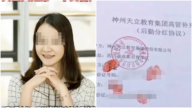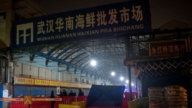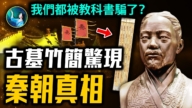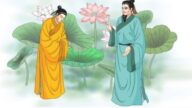【新唐人2011年3月7日讯】今年的中共人大、政协两会与往年一样,虽然各种提案五花八门,但是仍然老调重弹“坚持党的领导”、“稳定压倒一切”等。温家宝承认,收入悬殊、贪污腐败、高物价及高房价、食品安全等议题,在中国已造成很大民怨。与此同时,外媒指出,人大是亿万富翁俱乐部,引起各界关注。
被外界称作“橡皮图章”的中共全国人大3月5号开幕,温家宝在政府工作报告中,公布了下一个五年规划的主要目标,国内生产总值GDP年均增长率将保持在7%左右,明显低于上一个五年期间11.2%的年均增长率。
经济学家们指出,目前中国出现的通货膨胀和资产泡沫,是中共政府盲目追求GDP增长的结果。解决之道必须调整经济结构,改变以出口和投资为主导的外向型经济。
2011年中国将再度提升31省的最低工资标准,不过,飞涨的物价和房价严重的影响民众消费能力。
香港《开放》杂志执行编辑蔡咏梅说:“它这个社会财富分配是越来越不公正、不公平,那么中国的穷富悬殊则非常的严重。如果你缺乏公正的话,经济越发展、钱越多,反而内部的矛盾和冲突会越大。”
中国的贫富鸿沟引起中外媒体的关注。在人大新闻发布会上,彭博新闻社记者指出,经调查发现,有38名全国人大代表都是亿万富翁。
据胡润富豪榜统计,中共全国人大代表中最富有的70人总资产为4931亿元人民币,相当于751亿美元。而美国参众两院最富有的70位议员,总财产只有48亿美元。而美国的人均GDP是中国的10倍。
2010年胡润富豪榜1300多名超过10亿元人民币的中国富豪中,共有167位富豪是全国人大代表或政协委员。
温家宝在去年人大的政府工作报告中说,要让人民生活得更加幸福、更有尊严,让社会更加公正。
可是一年过后,官方《中国日报》援引《中国网》近日的网络调查显示,94%的中国民众感觉自己不幸福。中共体制性腐败导致的分配不公、贫富分化,引起民众极大的不满。
新加坡国立大学公共政策教授黄靖说:“我们知道,当你创造财富的时候,你不一定需要一个新的政治体系,但是当你试图分配财富的时候,你一定需要一个新的政治体系。我们看一下所有的政治改革、政治革命,其原因总是可以归结为财富的分配。”
中国体现贫富差距的基尼指数,从25年前的不足0.3猛升到接近0.5,远远超过导致社会动荡的0.4警戒线。
但面对最近席卷北非、中东地区的反独裁专制示威浪潮,中共不是实行政治改革,而是再次大幅增加今年维护稳定的公共安全开支。中国每年发生十万宗以上的社会群体性事件。
蔡咏梅说:“在民主自由的国家,它这个社会也会有危机、也会有矛盾,但是,这个社会会自我调解,它是因为通过一种民主制度,通过自由的信息,它会自身的就会把这些东西都解决掉。而这种极权专制的社会因为它是高压的,它都是一种信息封锁,而人民是缺乏自由的,它不能自我解决它的社会危机和矛盾,它积压到某一个程度,就解体了。”
在目前“茉莉花革命”波及中国之际,中共领导人害怕提及“民主”二字。温家宝在长达2小时的政府工作报告中,只有3次提到了“民主”。而胡锦涛在2007年党代会上,甚至60多次提到“民主”。
原香港《文汇报》东北办事处主任姜维平指出,共产党官员腐败问题愈演愈烈,最主要的原因是,反腐败并不能从制度上、根本上解决,而是从党内派别斗争的需要出发。
温家宝在政府工作报告中再次提出,积极稳妥地推进政治体制改革。但这项去年两会就提出的任务,至今仍然只是一句空洞的口号。
中国政改研究的学者陈永苗说:“共产党本身对社会政治矛盾的判断、分析都很清楚,但是问题是永远做不到,说的是一套、做的是一套,对现行的体制性的危机已经没有任何作用了,普通的网民都对它绝望。”
外界分析指出,中共所做的一切,都是为了维护它的专制体制和官僚特权利益,迟早会导致中国社会危机的总爆发,促使全民觉醒,抛弃中共、退出中共,才会迎来中国政治体制真正的变革。
新唐人记者李元翰、周天综合报导。
People’s Congress Turns to Billionaire Club
The CCP’s two meetings with People’s Congress and
Political Consultative Conference repeat the same tune
of Party leadership and stability.
Premier Wen admits corruption, income disparity,
housing and goods price soars, and food safety issues.
Overseas media report that People’s Congress
has become a millionaire club.
People’s Congress, known as the “rubber stamp,”
concluded its meetings on March 5.
Wen Jiabao reported on the next 5-year plan.
The GDP is expected to grow at 7% annually,
lower than the previous 11.2% annual growth rate.
Economists believe China’s inflation and asset bubble
are caused by the CCP’s sole pursuit of GDP.
It is necessary to re-structure the economy,
especially to re-orientate the export-oriented economy.
Wen said China will stabilize prices as a key task,
including stabilizing housing and goods prices.
He stressed improving people’s living standard,
and reducing the widening economic disparity.
Those officials who fail to perform well
in these key tasks will be held responsible.
China will increase minimum wages in 31 provinces.
But rising prices will dampen consumption capacity.
Cai Yongmei of Hong Kong’s Open magazine said,
income distribution is becoming more unfair
and the gap between the rich and poor is widening.
Without fairness, internal conflicts are bound to
become greater despite rapid economic growth.
Overseas media note China’s income disparity.
Bloomberg News pointed out that
38 people at People’s Congress are billionaires.
Hurun Report shows the 70 richest people
at the People’s Congress own US$75.1 billion.
In comparison, the richest 70 U.S. Congress members
only have assets of US$4.8 billion, while per capita GDP
of the U.S. is 10 times that of China’s.
of the U.S. is 10 times that of China’s.
who possess one billion Yuan RMB or above,
167 are the Chinese national congress members.
In last year’s congressional report, Wen Jiabao vowed
to enable the people to live more happily in dignity,
and bring more justice to the society.
Nevertheless, one year later, the official China Daily said
an online survey show 94% of Chinese people unhappy.
CCP’s systematic corruption caused unfair wealth
distribution, income disparity and great discontent.
Huang Jing, public policy professor at Singapore
National University: As we know, when creating wealth,
you may not need a new political system,
but when distributing wealth, you must have
a new political system in place. All the political
reforms and revolutions stem from wealth distribution.
China’s Gini Index, which reflects wealth disparity,
increased dramatically from 0.3 to nearly 0.5 now,
in a span of 25 years, surpassing the unrest limit of 0.4.
Regarding anti-dictatorship movements in North Africa
and Middle East, the CCP intensifies its suppression
by considerably increasing stability maintenance spending,
instead of carrying out political reforms.
Over 100,000 unrests take place in China every year.
Cai Yongmei: “In democracies, social crises and
conflicts exist, but the society can self-regulate
and resolve them through democracy and free info flows.
However, in a despotic society,
public opinions are suppressed and information is blocked,
and people do not have their freedom.
The society cannot self-regulate its crises and conflicts.
It will collapse when conflicts accumulate to a certain degree.
As the “Jasmine Revolution” is spreading in China,
the CCP leaders fear for the term “democracy”.
In Wen’s 2-hour-long report,
the word “democracy” was only mentioned 3 times.
In contrast, in the CCP’s national meeting in 2007,
Hu Jintao mentioned “democracy” over 60 times.
Former Northeastern Regional Director of Wenweipo, Jiang Weiping said,
Jiang Weiping said the corruption of communist party officials
is getting rampant. The main cause is that,
the anti-corruption campaign was not carried out
to fundamentally eliminate corruption, but was carried out
for the need of internal party struggle.
In his report, Premier Wen once again proposed to
actively push forward the political reform.
However, even though this task was raised last year,
it is still merely an empty slogan up to date.
Chen Yongmiao, a scholar on political reform of China
said: “The Communist Party’s assessments and analysis
on social and political conflicts were very clear,
but the problem is that it is never possible to carry out.
They say one thing but doing another, no effect on
the crisis of the existing social system.
People are despaired."
Foreign analysts pointed out, all the Communist China
has done is to maintain its interests of the authoritarian
and bureaucratic system. Sooner or later, it will lead to
the outbreak of China’s total social crisis,
when people awaken to abandon the CCP regime.
NTD reporters Li Yuanhan and Zhou Tian.




























